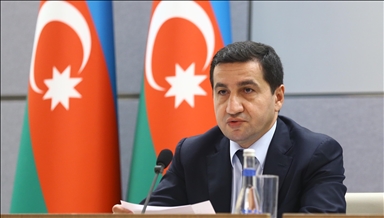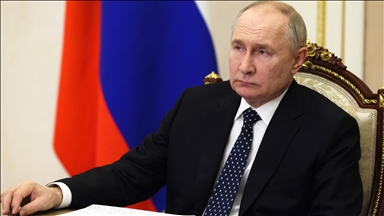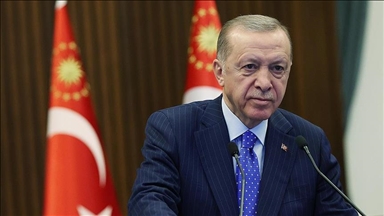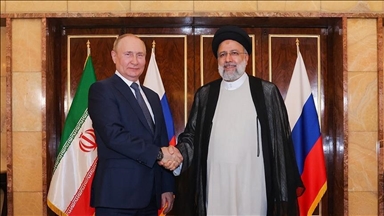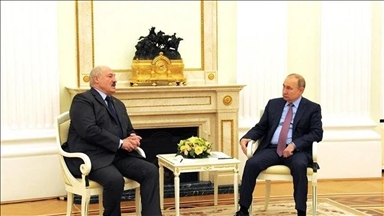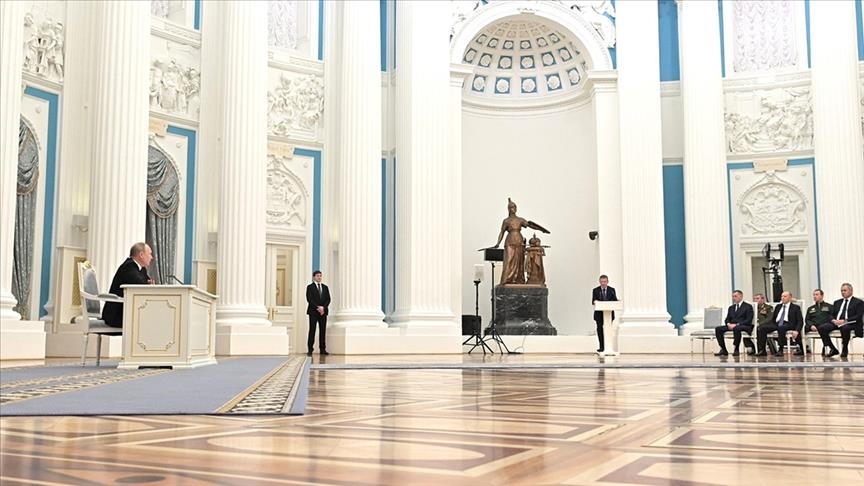
MOSCOW
In a move sure to further fuel tensions with the West, Russian President Vladimir Putin on Monday officially recognized Ukraine's breakaway Donetsk and Luhansk regions as independent states and signed the relevant agreements with the separatist leaders in the Kremlin.Putin also said he will request that Russia's parliament "immediately recognize" the agreements as valid.
He also called on Ukraine "to stop the hostilities in the Donbas region" of eastern Ukraine -- along Russia's border, where Donetsk and Luhansk are located -- saying that otherwise "the responsibility for what happens" will lie with the country's leaders.
'Modern Ukraine was entirely created by Russia'
Explaining his decision, Putin said the situation in Donbas has reached "a critical, acute stage," and that the time has come to make some steps.
Ukraine is not "just a neighboring country" for Russia but "an inalienable part" of the Russian history, culture, and spiritual space, "people bound by blood, by family ties," he continued.
"Since time immemorial, the people living in the south-west of what has historically been Russian land have called themselves Russians and Orthodox Christians. This was the case before the 17th century when a portion of this territory rejoined the Russian state and after.
"Modern Ukraine was entirely created by Russia or, to be more precise, by Bolshevik, Communist Russia," he said.
The process started right after the 1917 revolution, when Soviet leader Vladimir Lenin and his associates "separated, severed what historically Russian land is" to form the Soviet Republic of Ukraine, he added.
Then, another Soviet leader, Joseph Stalin, transferred to Ukraine some lands that previously belonged to Poland, Romania, and Hungary, giving to Poland as compensation "part of what was traditionally German land," Putin also noted.
Finally, in 1954, one more Soviet leader, Nikita Khrushchev, took Crimea away from Russia "for some reason" and also gave it to Ukraine.
"In effect, this is how the territory of modern Ukraine was formed," Putin said.
The president noted that Lenin and Stalin argued about the form of the young Soviet state, with Stalin defending the idea of building the country on "the principles of autonomisation" -- giving the future administrative and territorial entities broad powers upon joining a unified state, and Lenin insisting on "making concessions to the nationalists" and building a confederative state.
"This immediately raises many questions. The first is really the main one: why was it necessary to appease the nationalists, to satisfy the ceaselessly growing nationalist ambitions on the outskirts of the former empire? What was the point of transferring to the newly, often arbitrarily formed administrative units -- the union republics -- vast territories that had nothing to do with them? Let me repeat that these territories were transferred along with the population of what was historically Russia," he said.
Putin doubted Lenin's right "to make such generous (territorial) gifts, beyond the wildest dreams of the most zealous nationalists" along with the right to secede from the unified state without any conditions.
He suggested that Lenin's motives were a desire to stay in power at any coast, and for this, he agreed for everything, including "humiliating conditions of the Brest Peace" of World War I, when Kaiser's (Wilhelm II) Germany and its allies were about to lose, and also "satisfying any demands, any wishes from the nationalists inside the country."
"From the point of view of the historical destinies of Russia and its peoples, Lenin's principles of state-building turned out to be not just a mistake, it was, as they say, much worse than a mistake. After the collapse of the USSR in 1991, this became absolutely obvious," he noted.
The past cannot be changed, Putin said, insisting that "it is a historical fact" that Soviet Ukraine appeared as a result of the Bolshevik's policy.
"As a result of the Bolshevik policy, Soviet Ukraine arose, which even today can be rightfully called "Ukraine named after Vladimir Ilyich Lenin." He is its (Ukraine's) architect. This is fully confirmed by archival documents, including Lenin's strict directives on Donbas, which was literally squeezed into Ukraine," he said.
And now the "grateful descendants" have demolished monuments to Lenin in Ukraine, calling it "decommunization," Putin remarked.
"You want decommunization? Very well, this suits us just fine. But why stop halfway? We are ready to show what real decommunization would mean for Ukraine," he said in a threatening voice.
However, he said, life itself immediately showed that it was impossible to preserve such a huge and complex state as the Soviet Union or to manage it on the proposed confederate principles, which were "completely disconnected from reality and from historical tradition."
Putin said Stalin turned into a mere declaration of the confederative principles and created "a strictly centralized, absolutely unitary state," while adding that Stalin did not make the necessary amendments of the principal documents, including Lenin's constitution, "did not think about the future."
"It seems that the Communist Party leaders were convinced that they had created a solid system of government and that their policies had settled the ethnic issue for good. But the virus of nationalist ambitions is still with us, and the mine laid at the initial stage to destroy state immunity to the disease of nationalism was ticking. As I have already said, the mine was the right of secession from the Soviet Union," he said.
Putin also said that in the mid-1980s, the national issue returned on the agenda, reflecting "the increasing appetites of the local elites," but the Communist leadership did not take it seriously and responded with demagogy.
Meanwhile, fighting for the leadership in the Communist party, the Soviet politicians used the nationalists, promising everything instead of getting their support, he continued.
As a result, he said, in September 1989, the Communist Party adopted a document that paved the way for the collapse of the Soviet Union, the so-called ethnic policy of the party, which gave the rights of the sovereign states to the republics in the conditions of a severe social and economic crisis.
"Two years before the collapse of the USSR, its fate was virtually sealed. Now radicals and nationalists, including and above all in Ukraine, attribute to themselves the merit of gaining independence. As we can see, this is not the case at all.
"The historical and strategic mistakes of the Bolshevik leaders and the leadership of the Communist Party made at various times in state-building, the economic and national policy led to the collapse of our united country. The collapse of historical Russia under the name of the USSR is on their conscience," he charged.
Russian-Ukrainian ties after Soviet Union's collapse
Despite all "injustices, deception, and outright robbery," Russia that took shape after the dissolution of the USSR recognized the newly independent states and helped them, Putin noted.
Russia repaid entirely the Soviet foreign debt of about $100 billion, although initially it was suggested that all former Soviet republics would contribute to the payback, he added.
According to the expert assessments, Putin said, Ukraine got about $250 billion of benefits from Russia from 1991 to 2013, while Kyiv made claims on the diamond fund, gold reserves, and other assets of the former USSR abroad.
"The Ukrainian authorities preferred to act in such a way as to have all the rights and advantages in relations with Russia, but not to incur any obligations at the same time.
"Instead of partnership, parasitic attitude began to prevail, which on the part of the Kyiv official authorities sometimes acquired an absolutely unceremonious character. It is enough to recall the permanent blackmail in the field of energy transit and the banal theft of gas," Putin said.
Ukraine also used the dialogue with Russia for bargaining with the West, blackmailed it with rapprochement with Moscow, knocking out preferences, threatening with the growth of the Russian influence on Ukraine, he added.
Putin noted that the Ukrainian authorities from the first steps were using anti-Russian rhetoric that turned into "a form of aggressive Russophobia and neo-Nazism" and that led to many Ukrainians to fight against Russia during the Chechen war.
Also, he said, the external forces "were feeding their agents" and promoted them to power.
"It should be noted that Ukraine actually never had stable traditions of real statehood. And therefore, in 1991, it opted for mindlessly emulating foreign models, which have no relation to history or Ukrainian realities. Political government institutions were readjusted many times to the rapidly growing clans and their self-serving interests, which had nothing to do with the interests of the Ukrainian people," Putin said.
"The whole point of the so-called pro-Western civilizational choice of the Ukrainian oligarchic government was and is not to create better conditions for the well-being of the people, but to obsequiously render services to Russia's geopolitical rivals, save billions of dollars stolen from Ukrainians and hidden by oligarchs in Western bank accounts," he said.
2014 unrest in Ukraine
Meanwhile, Putin continued, the radicals had been more and more impudent, their claims had been growing, and in 2014 they used the protests on Maidan and, having the support from the foreign states, spearheaded the unrest.
"According to available data, the financial support of the so-called protest camp on Independence Square in Kyiv from the US Embassy amounted to $1 million a day. Additional very large sums were blindly transferred directly to the bank accounts of the opposition leaders. And it was about tens of millions of dollars," he said.
The radicals that ceased the power unleashed terror against dissenters and Ukrainian cities were "overwhelmed by a wave of pogroms and violence, a series of high-profile and unpunished murders," he criticized.
"It is impossible to recall without a shudder the terrible tragedy in Odessa, where participants of a peaceful protest were brutally murdered, burned alive in The House of Trade Unions. The criminals who committed this atrocity have not been punished. No one is looking for them. But we know them by name and will do everything to punish them, find them and bring them to justice," he warned.
Putin went on to say that the 2014 coup did not bring Ukraine closer to democracy and progress, the nationalists pushed Ukraine into the civil war and led to a harsh economic crisis.
About 15% of Ukraine's population left the country in search of work, after many major industrial companies were closed, the cost of the communal services jumped dramatically so that some families were not able to pay them.
"The collapse of the Ukrainian economy is accompanied by the outright robbery of the country's citizens, and Ukraine itself was simply driven under external control. It is carried out not only at the command of Western capitals, but also, as they say, directly on the spot -- through a whole network of foreign advisers, NGOs, and other institutions deployed on Ukraine," he said.
Putin insisted that an independent court system does not exist in Ukraine, supreme courts are formed by international organizations.
The foundation of Ukraine's policy is a confrontation with Russia, the Ukrainian parliament multiplies laws, prohibiting everything Russian, allowing the country's law enforcement to suppress freedom of speech, dissent, persecute the opposition, and even interfering in the church affairs, directed against the clergy and millions of parishioners of the Ukrainian Orthodox Church of the Moscow Patriarchate, he added.
Military confrontation between Russia and Ukraine
In March 2021, Ukraine adopted a new military strategy that was almost completely devoted to the confrontation with Russia, and eyes to involve the foreign states in the conflict with Russia, Putin said.
"The strategy suggests the organization of a terrorist underground in the Russian Crimea and on the territory of Donbas. The outlines of the alleged war are also spelled out in it, and it should end -- as it seems to today's Kyiv strategists, I will quote further -- 'with the assistance of the international community on favorable terms for Ukraine.' And also, as they say, today in Kyiv -- I am also quoting here, listen more carefully, please -- 'with the military support of the world community in the geopolitical confrontation with the Russian Federation.' This is nothing more than preparation for military operations against our country, against Russia," Putin stressed.
He said Ukraine also plans to create nuclear weapons, taking into account it has the Soviet heritage, knowledge, and some infrastructure, and that with the support of the West, it is easy for Ukraine to achieve this goal.
"Once Ukraine gets the weapons of mass destruction, the situation in the world, in Europe, especially for us, for Russia, will change dramatically. We cannot but react to this real danger, especially, I repeat, that Western patrons can facilitate getting such weapons by Ukraine to create another threat to our country," he said.
Putin continued that since 2014, the US spent billions of dollars for arming and training the Ukrainian military, the foreign advisors supervise Ukraine's armed forces and intelligence, NATO contingents are almost constantly stationed in Ukraine under the pretense of military drills that have "clear anti-Russian character."
He noted that Ukraine's military command centers are integrated into the NATO system, the legislation allows for the presence of foreign military troops in the country, at least 10 more military joint exercises are planned for 2022, foreign military bases are being opened under the "cover" of "military missions."
"It is obvious that such events serve as a cover for the rapid buildup of the NATO military group on the territory of Ukraine. Moreover, the network of airfields modernized with the help of the Americans -- Boryspil, Ivano-Frankivsk, Chuguev, Odessa, and so on -- is able to ensure the transfer of military units in the shortest possible time.
"The airspace of Ukraine is open for flights of strategic and reconnaissance aircraft of the United States, unmanned aerial vehicles that are used to monitor the territory of Russia.
"The Center of Naval Operations built by the Americans in Ochakov allows for the actions of NATO ships, including their use of precision weapons against the Russian Black Sea Fleet and our infrastructure on the entire Black Sea coast," Putin said, adding that the US intended to build similar facilities in Crimea in 2014, but the plans were thwarted by the decision of the peninsula's residents to go under Russia's jurisdiction.
Ukraine's admission to NATO
Putin said the 2008 Bucharest memorandum enshrines Ukraine's right to join NATO, which creates direct security threats for Russia.
Despite reassurances that Ukraine will not become an alliance member in the near future, no one wants to give Russia written guarantees confirming that, so it is an international document against words, Putin stressed.
"Moreover, we know the position and words of the leadership of the United States that active hostilities in the east of Ukraine do not exclude the possibility of this country joining NATO if it can meet the criteria of the North Atlantic Alliance and defeat corruption," he noted.
Putin said the same way Russia was reassured verbally about NATO's non-expansion in the 1990s, specifically at the moment of Germany's reunification in 1990.
"Today, one glance at the map is enough to see how Western countries have 'kept' their promise to stop NATO from advancing to the east. Simply deceived. We have received five waves of NATO expansion one after another.
"As a result, the alliance and its military infrastructure went directly to the borders of Russia. This became one of the key causes of the Euro-security crisis, had the most negative impact on the entire system of international relations, and led to the loss of mutual trust," he said.
Russia, on its part, pulled out all its troops from Europe and consistently offered different variants of cooperation with NATO.
Putin said he asked the then-US President Bill Clinton in 2000 about his opinion about prospects of Russia's admission to NATO, and the reaction was "moderate."
"How Americans really reacted to this opportunity is actually evident in their practical steps towards our country. This is open support for terrorists in the North Caucasus, disregard for our demands and concerns in the field of security in the expansion of NATO, withdrawal from the ABM (Anti-Ballistic Missile) Treaty, and so on," Putin said, asking: "... you don't want to see us as a friend and ally, but why make an enemy out of us?
"There is only one answer: it's not about our political regime. ... they just don't need such a big independent country as Russia. This is the answer to all questions. This is the source of the traditional American policy in the Russian direction, hence, the attitude to all our proposals in the field of security," he said.
Russia's security concerns
Putin said the US military capabilities in Europe have been increasing and that the US strike systems in Poland and Romania can be used for offensive purposes.
Deployment of military objects in Ukraine will raise military threats for Russia dramatically, especially the danger of an unexpected strike at the country, taking into account that many Ukrainian airfields are located close to the Russian borders, allowing to hit all European parts of Russia as well as targets beyond the Ural Mountains.
"In American strategic planning documents -- in documents -- the possibility of a so-called preemptive strike on enemy missile systems has been fixed. And we also know who is the main opponent for the United States and NATO: It is Russia.
"In NATO documents, our country is officially explicitly declared the main threat to Euro-Atlantic security. And Ukraine will serve as a forward springboard for such a strike. I want this to be understood in Russia and in Ukraine," he said.
Putin said that in 2008, Russia suggested signing a treaty on European security, but the proposal was rejected, while Moscow last year came up with another initiative, but its main points about NATO's non-expansion, non-deployment of strike weapons in countries neighboring Russia and return of NATO's military infrastructure to the condition of 1997 were ignored.
"Moreover, they are trying to blackmail us again. They are threatening us with sanctions again, which, by the way, they will still introduce as Russia's sovereignty strengthens and the power of our armed forces grows. And the pretext for another sanctions attack will always be found or simply fabricated, and regardless of the situation in Ukraine. There is one goal -- to restrain the development of Russia. And they will do it, as they did it before, even without any formal pretext at all, just because we exist and will never compromise our sovereignty, national interests, and our values.
"I want to say clearly, directly, in the current situation, when our proposals for an equal dialogue on fundamental issues have actually remained unanswered by the United States and NATO, when the level of threats to our country is significantly increasing, Russia has every right to take retaliatory measures to ensure its own security. That's exactly what we will do," he said.
Situation in Donbas
Putin said Kyiv and the West have been stalling for years the implementation of the Minsk agreement, containing a clear set of steps necessary to restore the peace in Ukraine.
"Every single day, settlements of Donbas are being shelled. The formed large military group constantly uses drones, heavy equipment, missiles, artillery, and multiple launch rocket systems. The killing of civilians, the blockade, the bullying of people, including children, women, the elderly, does not stop. As we say, there is no end in sight.
"And the so-called civilized world, the only representatives of which our Western colleagues have self-proclaimed themselves, prefers not to notice this, as if there is no such horror, genocide, to which almost 4 million people are subjected, and only because these people did not agree with the coup supported by the West in Ukraine in 2014, they opposed declaring of an aggressive nationalism and neo-Nazism as a state movement," he said.
The presidents and lawmakers in Ukraine take turns, but the core "of the aggressive nationalists' regime" does not change, he said.
"In this regard, I consider it necessary to take a long-overdue decision -- to immediately recognize the independence and sovereignty of the Donetsk People's Republic and the Luhansk People's Republic.
"I ask the Federal Assembly of the Russian Federation to support this decision and then to ratify Treaties on Friendship and Mutual Assistance with both republics. These two documents will be prepared and signed in the very near future.
"And from those who have seized and are holding power in Kyiv, we demand an immediate cessation of hostilities. Otherwise, the entire responsibility for the possible continuation of the bloodshed will be entirely on the conscience of the regime ruling on the territory of Ukraine," he said.
Anadolu Agency website contains only a portion of the news stories offered to subscribers in the AA News Broadcasting System (HAS), and in summarized form. Please contact us for subscription options.



